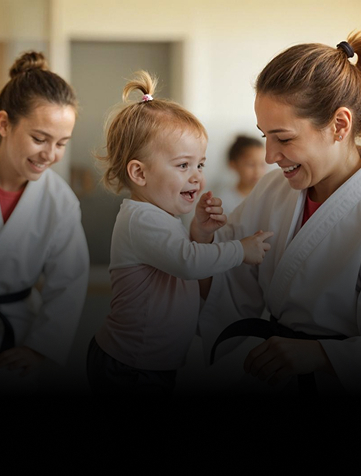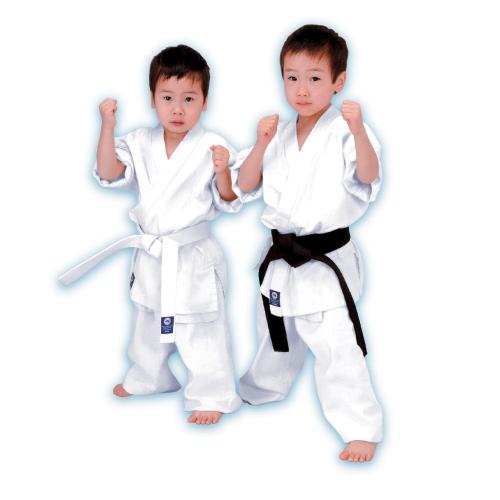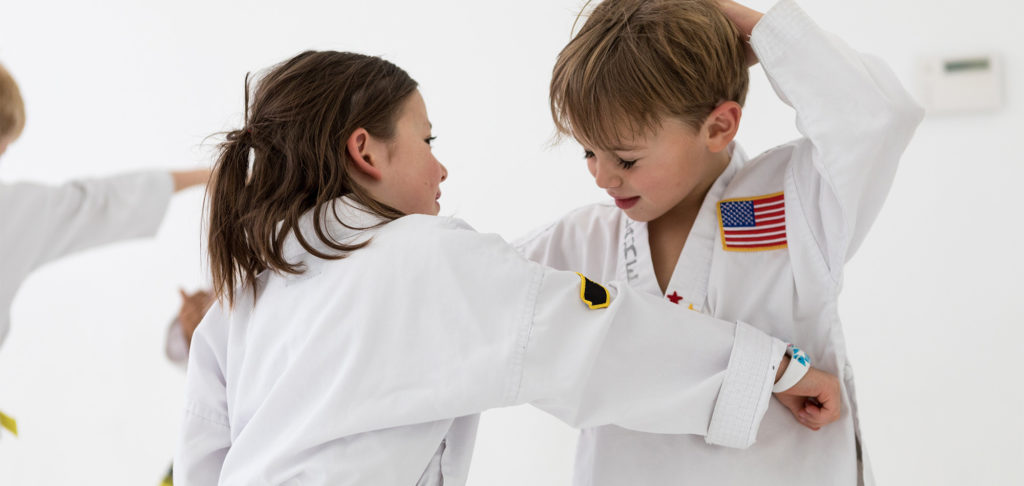Family Martial Arts – Share Fitness and Fun as a Whole Family
Family Martial Arts – Share Fitness and Fun as a Whole Family
Blog Article
Exactly How Karate for Kids Can Increase Confidence and Self-control in Young Martial Artists
Karate for children supplies an unique opportunity to develop confidence and discipline in young martial musicians. As they discover brand-new methods and face obstacles, they not only acquire skills but likewise create a strong sense of self-regard. This structured setting urges them to value the trip of renovation. How does this training convert into their daily lives? Discover the deeper links that make karate even more than simply a sport.
The Significance of Self-confidence in Youth Advancement
Self-confidence is an essential building block in youth development. When you support your kid's self-esteem, you encourage them to face challenges, take risks, and reveal themselves openly. Children with confidence are a lot more eager to check out social scenarios and brand-new tasks, which can bring about lasting relationships and important experiences.Encouraging your youngster to tip out of their comfort area cultivates resilience. They find out that failure isn't the end but rather a stepping rock to success. By commemorating their achievements, no matter how little, you help them recognize their capacities and worth.In this trip, assistance and favorable support from you play a vital role. Whether it's through appreciation or merely existing, your participation enhances their self-confidence. As they expand, this confidence ends up being a lifelong asset, equipping them to navigate both obstacles and chances with a strong feeling of self.
Just How Karate Teaches Self-control and Emphasis
Martial arts helps you build self-control and emphasis with its organized training program. As you practice mindfulness throughout each session, you'll discover to focus much better both on and off the floor covering. Plus, establishing and achieving goals in karate reinforces your ability to stay attentive and dedicated.
Structured Training Routine
While you engage in karate training, you'll quickly find how a structured routine imparts technique and focus in young practitioners. Each class complies with a particular format, consisting of warm-ups, method method, and sparring. This uniformity instructs you to devote and respect the procedure to enhancement. As you discover forms and techniques, you develop a feeling of obligation for your very own progress.The structured setting urges you to establish goals, whether mastering a brand-new belt or perfecting a kata. You'll locate that remaining concentrated throughout drills and classes hones your concentration. The discipline you cultivate in martial arts expands past the dojo, positively influencing your schoolwork and day-to-day regimens. Each session enhances the relevance of devotion, helping you expand into an extra regimented person.
Mindfulness in Technique
As you practice karate, you'll discover that mindfulness comes to be a vital part of your training. Each move needs your complete focus, helping you stay concentrated on the here and now minute. You'll discover to disregard disturbances and concentrate on your breathing, activities, and objectives. This increased recognition sharpens your reflexes and improves your discipline.During sparring or types, you'll uncover the importance of being mentally existing - Karate Salisbury MD. You'll observe how this emphasis not only boosts your strategy yet additionally builds your self-confidence. By practicing mindfulness in karate, you cultivate patience and resilience, crucial attributes that expand beyond the dojo. By doing this, martial arts teaches you to harness your mind, assisting you create a self-displined approach to difficulties both on and off the mat

Personal Goal Setting Techniques
Setting goals in karate isn't practically making belts; it's an effective way to grow self-control and emphasis. When you set particular, achievable targets, you develop a roadmap for your progress. As an example, rather than simply aiming to improve your kicks, attempt concentrating on mastering a specific technique every month. This strategy keeps you inspired and engaged.Breaking down larger objectives right into smaller, manageable actions aids you track your progression and celebrate tiny triumphes in the process. Whether it's perfecting your stance or raising your sparring endurance, every objective reinforces your commitment. As you accomplish these goals, you'll construct self-confidence in your skills and create a strong feeling of technique that expands beyond the dojo right into day-to-day life.
Building Resilience Via Martial Arts
Fighting style, particularly karate, uses kids a distinct opportunity to build strength in a helpful setting. In courses, they face obstacles that press their restrictions, whether it's sparring Continue or grasping a new technique with a partner. Each setback, like a missed out on kick or a lost suit, ends up being a chance to find out and grow.As they exercise, youngsters find out to embrace discomfort and maintain trying, even when points obtain difficult. They find that failure isn't the end; it's component of the journey. This mindset helps them get better stronger, not just in the dojo, but in day-to-day life.With each difficulty they conquer, your child builds self-confidence in their capacity to take on obstacles, fueling their determination. With martial arts, they'll recognize that resilience isn't nearly physical toughness; it has to do with psychological grit and perseverance, encouraging them to encounter whatever life tosses their method.
The Role of Regard in Karate Educating
Respect is a fundamental principle in karate training, fostering a culture of self-control and sociability among trainees. When you tip onto the dojo flooring, you're not simply learning techniques; you're also learning to respect your teachers, peers, and the art itself (Karate Salisbury MD). Bowing at the beginning and end of course isn't simply a formality; it signifies your recommendation of others' initiatives and dedication.As you create common respect, you'll find it enhances your learning experience. You'll listen more diligently to your instructor and gain insights from fellow trainees. This atmosphere urges constructive criticism and assistance, enabling everyone to grow together.Moreover, regard grows self-control. Recognizing the value of effort and humbleness aids you stay focused on your training. In turn, this regard equates into your daily life, improving your communications and partnerships outside the dojo. Via martial arts, you discover that regard is crucial for individual growth and neighborhood building
Establishing Goals and Accomplishing Success in Martial arts

Social Skills and Teamwork in the Dojo
While training in the dojo, youngsters naturally create necessary social skills and teamwork capabilities. As they practice along with peers, they discover to communicate successfully, share space, and support each other. Each course presents opportunities for collaboration, whether it's throughout partner drills or group workouts. This synergy promotes friendships and develops a feeling of belonging, making the dojo a nurturing environment.Kids also get useful problem resolution abilities. When they come across difficulties, such as disagreements during sparring, they find out to navigate these circumstances constructively. They exercise persistence and compassion, understanding that every person has various toughness and weaknesses.Moreover, joining group tasks cultivates a feeling of responsibility. You'll see your kid discovering to rely on teammates and take responsibility for their duty in a group. These experiences not only improve their martial arts journey yet likewise furnish them with social devices they'll carry into other areas of life.

The Long-Term Benefits of Martial Arts Beyond Childhood
As youngsters mature and move right into the adult years, the benefits of martial arts extend much beyond the dojo. You'll discover that the discipline and emphasis learned with martial arts can equate right into your academic and professional life. Establishing and attaining objectives in fighting styles promotes a strong work values, which can push you to master any kind of endeavor.Moreover, the confidence gained from sparring and grasping methods can improve your self-confidence, aiding you deal with challenges head-on. This durability becomes indispensable as you face the unpredictabilities of adulthood.Additionally, the social abilities created through teamwork and camaraderie in the dojo can result in better partnerships in both professional and individual rounds. You'll learn to connect efficiently, willpower problems, and construct a helpful network.Ultimately, karate forms not just knowledgeable martial artists, yet all-round individuals ready to take on the world.
Frequently Asked Inquiries
What Age Is Ideal to Beginning Karate for Children?
You can begin karate as early as age 4 or 5, yet it frequently relies on your youngster's maturity and look at this web-site rate of interest. Finding a course that suits their age and energy level makes a big difference.
Are There Any Health Perks From Practicing Martial Arts?
Yes, exercising karate offers countless health advantages. You'll enhance your strength, control, and versatility while boosting cardio health you can try here and fitness. And also, it improves focus and psychological well-being, making it a wonderful selection for overall physical and mental health.
How Usually Should Youngsters Attend Karate Classes?
You should urge your youngsters to go to karate classes at the very least 2 to 3 times a week. Uniformity helps them learn strategies successfully and establish skills, making their experience a lot more rewarding and pleasurable in the future.
Can Karate Assist With Handling Anxiety in Kid?
Yes, karate can aid manage stress and anxiety in kids. It shows focus and self-constraint while supplying a risk-free electrical outlet for energy. You'll notice your kid growing much more positive and calm as they exercise routinely.
What Gear Is Required for Kids Starting Karate?

Report this page